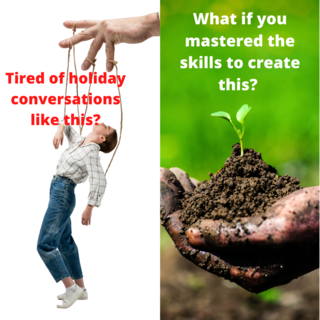Leadership
Holiday To Do: Stop Avoiding Difficult Conversations
Self-compassion helps you hang in when the talking is tough.
Posted November 27, 2021 Reviewed by Vanessa Lancaster
Key points
- Humans are neurologically wired to self-protect from pain and seek satisfaction.
- Self-compassion helps people face the discomfort of difficult conversations.
- Self-compassion involves bringing mindfulness to emotional pain or distress and bringing kindness and care to this pain.
“Pull the thorns from your heart. Then you will see the rose gardens within you.” – Rumi, 13th Century Poet, and Mystic
“The doer alone learns.” – Bruce Lee, Martial Arts Master, Philosopher and Film Star
It is crucial that you start having difficult conversations and start learning to master them. Along the way, practicing self-compassion is key to transforming the muck of your difficult interactions – the blame, shame, resentment, and anxiety – into the prize of connection, solutions, and leadership in your relationships at home and at work.
There have been conversations I was far from mastering. Many years ago, a trainee of mine was falling far short of what her clients needed. The focus for her appeared to be compulsive over-doing in a grab for recognition. She even fell asleep in session with a client. When awake, she often pushed her agendas on clients and had a large no-show rate.
She was also personally connected to someone I felt indebted to. It’s clear she was not mastering her conversations with clients. Falling prey to an old habit of avoiding the discomfort of confrontation, I sidestepped the inner call to give her direct feedback on her behavior and priorities in her role with clients. I avoided the elephant in the room, even the sleeping one.

You have likely experienced similar pain points when faced with difficult conversations. When others are on a volatile warpath, you may have found yourself lashing out or looking for the door. When the other person is smug in their “rightness,” you’ve felt pulled into arguing your point to the end. When faced with sarcasm or the insincere sure-have-it-your-way deflection, you felt pulled to yank them toward something approaching honesty and clarity only to end up with a Grand Canyon of the uninspiring distance between you.
Difficult conversations are indeed painful. The remedy starts with self-compassion.
There are five key reasons why we need to have and master difficult conversations:
1. We are neurologically wired to self-protect from pain and seek satisfaction. Neuroscientists like Judson Brewer at Brown University have done the research linking the habit “loops” of triggering cues, behavior, and the results (like lessened discomfort) to ongoing habits like smoking, overeating, and even anxiety itself.
The human brain’s ability to form habits that put behavior on autopilot to secure rewards and lessen threat and pain ensured our survival as a species millennia ago. The problem is that human brains have not updated to the current social complexity of relationships.
Your brain is wired for eluding the points of spears, and saber-tooth tiger fangs, not the unfollows and defriendings of the modern world. As a result of your outmoded mental hardware, you are prone to forming bad habits of unskillfulness in difficult conversations – again, because they’re painful!
Therefore, all of us deserve a heaping helping of self-compassion when it comes to avoiding, blaming, escalating, sabotaging, and all the other things humans do when the talking gets tough.
2. And yet, even though your brain biases you and primes you for less-than-ideal communication habits, you can groove your brains to do better. The practice of mindfulness and self-compassion are key tools for training yourself to a higher level of conversational operation.
Self-compassion involves bringing mindfulness to your emotional pain or distress, connecting to the universal nature of these pain points in many other people, and intentionally bringing a stance (and action) of kindness and care to this pain.
3. To not develop higher habits (like self-compassion) in difficult conversations means you should all strap in for more polarization, disconnection, prejudice, decreased productivity, and poorer results. To develop these new habits of presence, perspective, and heat-of-the-moment creative impact gives you access to the improbable but not impossible – connection, creative in-roads to solutions, and opportunities for in-the-moment leadership.
4. The higher conversational, self-compassionate habit-warriors are the knot-untiers – the bridge-builders – the compassionate rabble-rousers you and I need in workplaces and our homes.
5. The higher self-compassionate conversational habit-warriors are the ones who bring opportunities for healing of rifts and empowerment to others. They model and inspire possibility for others in daily life.
I do not have a time machine to go back and have the conversation with my trainee she (and I) needed to have. She needed me to aim for the truth in her painful experience behind her nodding off and agenda pop-offs with clients. She needed a compassionate dope slap to create a possibility for true change.
I needed self-compassion for my anxiety habits and the suffering they created to rise to a higher level as a leader. Lesson learned.
None of us have a time machine to go back and fix our past conversational mistakes, but there is a timeless machine. With a willingness to wield tools like self-compassion, imperfectly for sure, you can do much to bring grace to your own mistakes and pain from tough conversations. And by the way, owning error is one of the other tools in the box.
You need go-tools that ground, regulate, open perspective, and lean you in toward the truth behind others’ actions. And that’s just the beginning.
Only then are we claiming prizes in difficult conversations. Bruce Lee made his movies, wrote philosophy, and forged mastery in martial arts by 32. He was a doer, and as a result, he learned. If you’re willing to bring self-compassion and other tools to bear, you might do the same when the talking is tough.
Practice: A Simple Gesture of Self-Compassion for Difficult Conversations
Here’s a simple way to practice self-compassion before or after a difficult conversation, just in time for the holidays when difficult conversations seem rampant.
1. Call to mind a recent difficult conversation in which you may have behaved unskillfully and was painful in some way. Vividly imagine it until your body and mind are stirred with some degree of charge – of discomfort.
2. On a slow in-breath, bring your hands to your heart, join them loosely together, or perhaps rest your palms gently alongside your cheeks – in a way that fits for you, place your hands in a gesture of kindness and care.
3. On a slow out-breath, feel the warmth of your hands and notice the effect this gesture has on your experience of this moment. This is self-compassion.
4. Come back here again and again, particularly for easing the pain of these conversations that are yours, mine, and the case for all of us at various points in our lives.
References
Practice Resources
1. Here is a guided meditation and downloadable infographic for Dr. Abblett’s “Fist Breathing” mindfulness practice for difficult conversations. https://www.drmitchabblett.com/access-resources
This practice is a crucial step in opening yourself up and away from the tough inner reactions to a challenging conversation with someone in your personal life or at work.
Books and Articles
1. Hickman, Steven (2021). Self-compassion for dummies. John Wiley & Sons.
2. Neff, Krisin and Germer, Chris. (2018). The mindful self-compassion workbook. Guilford Press.
3. Neff, Kristin (2015). Self-compassion: The proven path of being kind to yourself. William Morrow.
4. Schellekens, Melanie, et al. (2017). Are Mindfulness and Self-Compassion Related to Psychological Distress and Communication in Couples Facing Lung Cancer? Mindfulness, 8, 325-336.
5. Abblett, M. (2021). Prizeworthy: How to meaningfully connect, build character and unlock the potential of every child. Shambhala.




